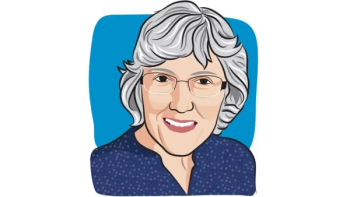
Gene Testing Can Help Improve Ovarian Cancer Care and Decision Making
Knowing which kind of therapy works best can help in determining the ideal cancer care for patients.
In recent years, the Food and Drug Administration approved several maintenance therapies for the management of platinum-sensitive recurrent ovarian cancer. Clinical trials that led to these approvals involved Avastin (bevacizumab), tyrosine kinase inhibitor (TKI) therapy or PARP inhibitor therapy. Knowing which of these works best can help in determining best cancer care for patients.
“In 2015, ASCO and ESMO published their value frameworks to assist physicians and patients in assessing the value of novel cancer treatments,” said Jonathan Foote, M.D., Duke University Medical Center in Durham, North Carolina.
To access the value of the maintenance therapies and biomarkers to direct treatment, investigators from Duke University Medical Center; David Geffen School of Medicine at UCLA in Los Angeles; The Ohio State University, James Cancer Hospital in Columbus, Ohio; and Memorial Sloan Kettering Cancer Center in New York City, used the American Society of Clinical Oncology’s (ASCO) Net Health Benefit (NHB) and the European Society for Medical Oncology’s (ESMO) Magnitude of Clinical Benefit Scale (MCBS).
NHB examines clinical benefit, toxicity, long-term survival, palliation of symptoms, treatment-free interval and quality of life. Total possible NHB score is 180. MCBS is based on clinical benefit grade, early stopping of crossover, toxicity, quality of life and adjustments. The highest grade available is a 4 — ESMO considers this to be a high-value grade.
In particular, the researchers evaluated maintenance trials in ovarian cancer, including:
- the OCEANS and GOG 213 trials for bevacizumab treatments;
- ICON6 for cediranib, a TKI; and
- the Study 19, NOVA, SOLO2, and ARIEL3 trials to evaluate a variety of PARP inhibitors.
Investigators determined higher ASCO and ESMO value assessments in women with germline- or somatic-BRCA mutations or tumor homologous recombination deficiency (HRD) positivity treated with PARP inhibitor, according to study findings presented during the 49th Society of Gynecologic Oncology (SGO) Annual Meeting on Women’s Cancers held in New Orleans March 24-27.
ASCO composite value scores for concurrent plus maintenance Avastin were 35 in the OCEANS trial and 26 in GOG 213 trial. TKI ASCO composite score was 30 in the ICON6 trial. ESMO’s value grades were comparable.
Targeted composite value comparison for germline and somatic BRCA mutations in the PARP inhibitor trials SOLO2, Study 19, NOVA, and ARIEL3 ranged from 47 to 62. “These are the highest value scores observed in maintenance therapy for platinum-sensitive recurrent ovarian cancer,” said Foote.
Both ASCO and ESMO composite values were compared for patients with wild-type BRCA, HRDs and germline and somatic BRCA mutations. In the PARP inhibitor trials, scores ranged from 26 to 62. ESMO scores were comparable. ASCO scores for non-biomarker-based PARP inhibitor and Avastin were similar, noted Foote.
Foote described some limitations to the study. “ASCO and ESMO value scores are not intended to compare clinical trials to each other,” he said. “However, we found that comparing the relative value of treatments using these tools is a very objective measure of benefit that can be used to counsel patients.”
In addition, value frameworks don’t allow for incorporation of both progression-free survival and overall survival data, cost was not considered and there is an unknown effect of biomarker status in patients undergoing maintenance therapies other than PARP inhibitors.
Genetic testing can be beneficial in terms of the management of patients, such as surgical treatment, prognosis and risk for additional cancers, according to ASCO. It can also help in creating individualized care and shared decision making regarding cancer care.
“Our data highlights the importance germline and somatic BRCA testing to differentiate treatment value and to assist in treatment decisions,” said Foote.



